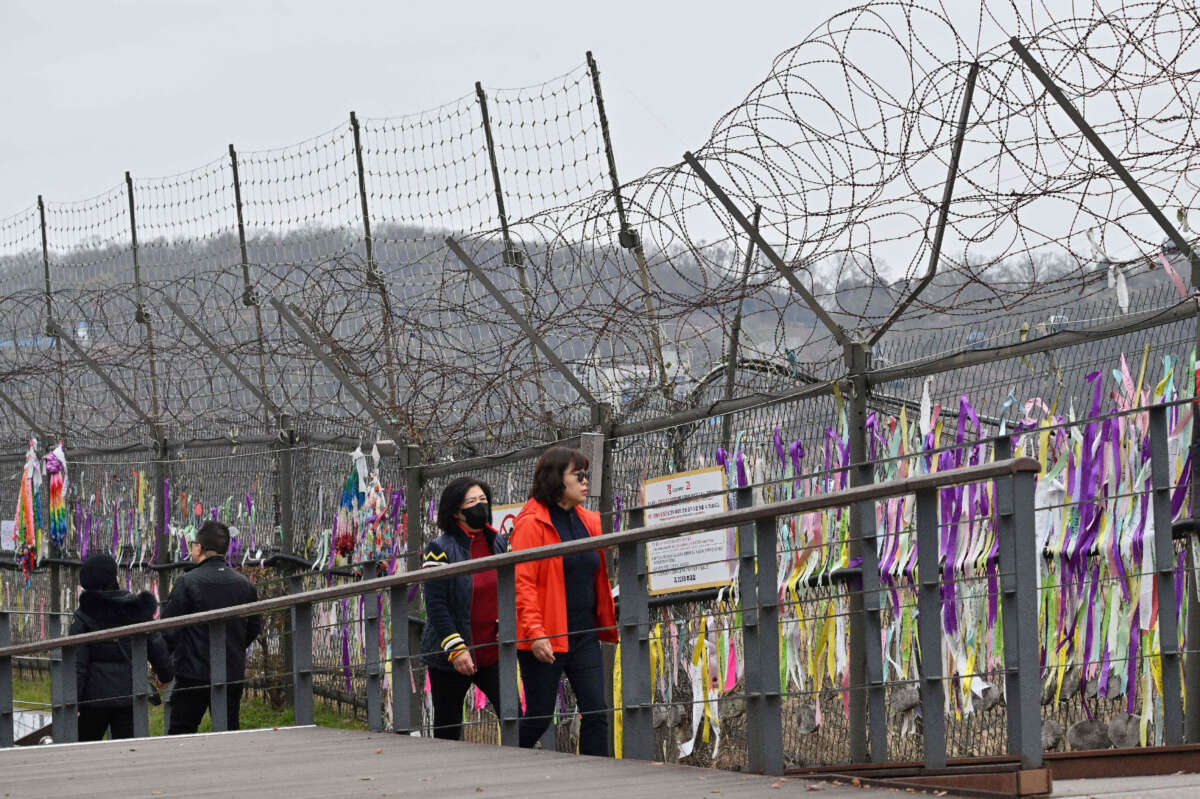Support justice-driven, accurate and transparent news — make a quick donation to Truthout today!
Human rights in North Korea are currently in the spotlight. In addition to a recent conference on North Korean human rights held in Honolulu, there’s also a new documentary, Beyond Utopia, about North Korean defectors that is receiving Oscar buzz.
We can expect to hear more about North Korea human rights in 2024, the 10-year anniversary of the United Nations Report of the Commission of Inquiry on Human Rights in the Democratic People’s Republic of Korea, a landmark report that concluded that North Korea was committing crimes against humanity.
While there are many legitimate concerns about human rights in North Korea, the question is how can we actually improve the daily lives of North Koreans? And is the current U.S. approach helping or hurting the situation?
While many in Washington advocate for more pressure in the form of sanctions and an information offensive, history has shown that these actions do not improve human rights. Instead, they increase tensions, and North Korea responds by doubling down on its nuclear weapons program. As Elizabeth Beavers and Su-mi Jeon noted for The Hill, “the status quo has been an unmitigated failure in terms of improving both rights and security.”
North Korea is already one of the most sanctioned countries in the world, and evidence suggests that sanctions are worsening the humanitarian situation. Dr. Kee Park of the Harvard University Department of Global Health and Social Medicine and a neurosurgeon who has performed surgeries in North Korea calls the sanctions a “complete economic blockade“ and “warfare without bullets.”
“Sanctions kill,” Park argues. “We know it and we should not accept that… We have allowed our leaders and our examples of our morals to deteriorate. We have become barbarians because we accept the death of children and women in the name of national and regional security.”
Sanctions and the U.S. travel ban on North Korea have also significantly hindered the delivery of humanitarian aid, according to Joy Yoon, the co-founder of IGNIS Community, a nonprofit organization working in North Korea. And high military tensions are not conducive to humanitarian aid work.
What is fundamentally missing in the human rights discourse is recognition of the ongoing state of war on the Korean Peninsula, which provides the North Korean government justification to invest its limited resources on defense and maintaining a national security state. (The Korean War only ended in an armistice, so the U.S. and North Korea have technically remained in a state of war ever since.) The U.N. Special Rapporteur on DPRK Human Rights, Elizabeth Salmon, has noted that North Korea’s militarization severely impacts human rights because the government under-invests in socio-economic development, which disproportionately affects children and women.
Instead of continuing the status quo of more pressure and sanctions, ending the state of war with a peace agreement would be more conducive to improving human rights and security — specifically by building trust, sapping the militarism that undergirds the human rights abuses, and creating the conditions to engage more effectively on human rights.
As Tomás Ojea Quintana, former UN Special Rapporteur on the Situation of Human Rights in North Korea, said in his 2020 report: “A declaration on peace and development in the Korean Peninsula, and a swift resolution of the armistice status, would create the atmosphere and space needed for further discussions on denuclearization, less isolation, more access, and respect for human rights.”
In fact, in 2019, following the historic peace summits between the two Koreas and the United States, North Korea engaged in the first ever Universal Periodic Review at the Human Rights Council in Geneva, and then participated in a two-week-long human rights workshop. Peace summits also led North Korea to self-impose a moratorium on nuclear and missile tests, to cooperate with South Korea on removing landmines in the DMZ, and to repatriate the remains of U.S. servicemen.
Not only have decades of war, sanctions, and isolation forced North Korea to adapt and become more resilient to pressure. But China and Russia, two members of the UN Security Council, are no longer willing to go along with the U.S.-led calls for more sanctions.
To truly create genuine human security and the conditions for improved human rights, we need to end the unresolved Korean War — which is only justifying the endless arms race, keeping families separated, and continuing the risk of nuclear conflict. “What will improve the ordinary North Korean people’s situation is more engagement with people from the outside world, not less,” said Cassie Kim, a North Korean defector now living in the United States.
Press freedom is under attack
As Trump cracks down on political speech, independent media is increasingly necessary.
Truthout produces reporting you won’t see in the mainstream: journalism from the frontlines of global conflict, interviews with grassroots movement leaders, high-quality legal analysis and more.
Our work is possible thanks to reader support. Help Truthout catalyze change and social justice — make a tax-deductible monthly or one-time donation today.
